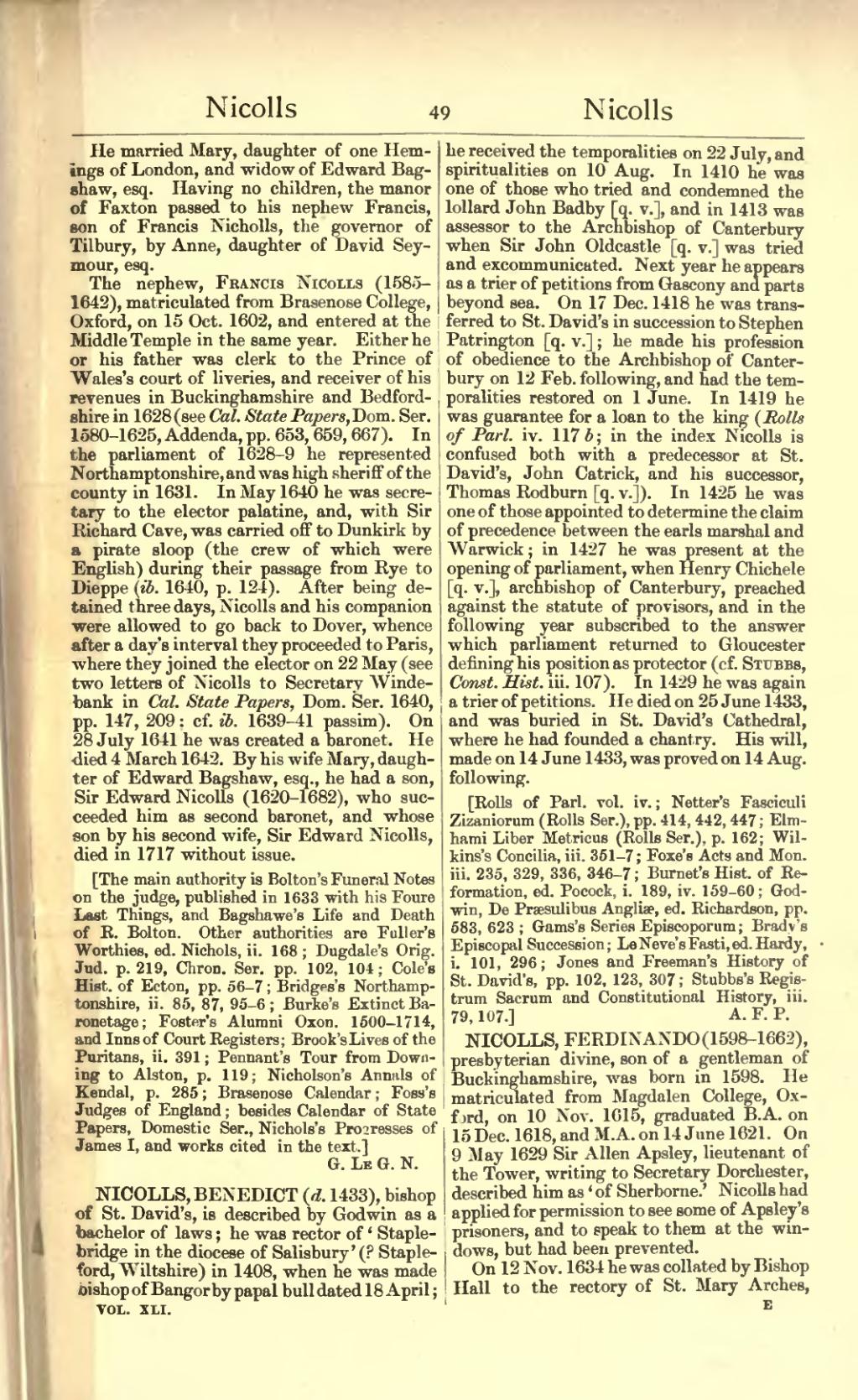He married Mary, daughter of one Hemings of London, and widow of Edward Bagshaw, esq. Having no children, the manor of Faxton passed to his nephew Francis, son of Francis Nicholls, the governor of Tilbury, by Anne, daughter of David Seymour, esq.
The nephew, Francis Nicolls (1585–1642), matriculated from Brasenose College, Oxford, on 15 Oct. 1602, and entered at the Middle Temple in the same year. Either he or his father was clerk to the Prince of Wales's court of liveries, and receiver of his revenues in Buckinghamshire and Bedfordshire in 1628 (see Cal. State Papers, Dom. Ser. 1580–1625, Addenda, pp. 653, 659, 667). In the parliament of 1628–9 he represented Northamptonshire, and was high sheriff of the county in 1631. In May 1640 he was secretary to the elector palatine, and, with Sir Richard Cave, was carried off to Dunkirk by a pirate sloop (the crew of which were English) during their passage from Rye to Dieppe (ib. 1640, p. 124). After being detained three days, Nicolls and his companion were allowed to go back to Dover, whence after a day's interval they proceeded to Paris, where they joined the elector on 22 May (see two letters of Nicolls to Secretary Windebank in Cal. State Papers, Dom. Ser. 1640, pp. 147, 209; cf. ib. 1639–41 passim). On 28 July 1641 he was created a baronet. He died 4 March 1642. By his wife Mary, daughter of Edward Bagshaw, esq., he had a son, Sir Edward Nicolls (1620–1682), who succeeded him as second baronet, and whose son by his second wife, Sir Edward Nicolls, died in 1717 without issue.
[The main authority is Bolton's Funeral Notes on the judge, published in 1633 with his Foure Last Things, and Bagshawe's Life and Death of R. Bolton. Other authorities are Fuller's Worthies, ed. Nichols, ii. 168; Dugdale's Orig. Jud. p. 219, Chron. Ser. pp. 102, 104; Cole's Hist. of Ecton, pp. 56–7; Bridges's Northamptonshire, ii. 85, 87, 95–6; Burke's Extinct Baronetage; Foster's Alumni Oxon. 1500–1714, and Inns of Court Registers; Brook's Lives of the Puritans, ii. 391; Pennant's Tour from Downing to Alston, p. 119; Nicholson's Annals of Kendal, p. 285; Brasenose Calendar; Foss's Judges of England; besides Calendar of State Papers, Domestic Ser., Nichols's Progresses of James I, and works cited in the text.]
NICOLLS, BENEDICT (d. 1433), bishop of St. David's, is described by Godwin as a bachelor of laws; he was rector of ‘Staplebridge in the diocese of Salisbury’ (? Stapleford, Wiltshire) in 1408, when he was made bishop of Bangor by papal bull dated 18 April; he received the temporalities on 22 July, and spiritualities on 10 Aug. In 1410 he was one of those who tried and condemned the lollard John Badby [q. v.], and in 1413 was assessor to the Archbishop of Canterbury when Sir John Oldcastle [q. v.] was tried and excommunicated. Next year he appears as a trier of petitions from Gascony and parts beyond sea. On 17 Dec. 1418 he was transferred to St. David's in succession to Stephen Patrington [q. v.]; he made his profession of obedience to the Archbishop of Canterbury on 12 Feb. following, and had the temporalities restored on 1 June. In 1419 he was guarantee for a loan to the king (Rolls of Parl. iv. 117 b; in the index Nicolls is confused both with a predecessor at St. David's, John Catrick, and his successor, Thomas Rodburn [q. v.]). In 1425 he was one of those appointed to determine the claim of precedence between the earls marshal and Warwick; in 1427 he was present at the opening of parliament, when Henry Chichele [q. v.], archbishop of Canterbury, preached against the statute of provisors, and in the following year subscribed to the answer which parliament returned to Gloucester defining his position as protector (cf. Stubbs, Const. Hist. iii. 107). In 1429 he was again a trier of petitions. He died on 25 June 1433, and was buried in St. David's Cathedral, where he had founded a chantry. His will, made on 14 June 1433, was proved on 14 Aug. following.
[Rolls of Parl. vol. iv.; Netter's Fasciculi Zizaniorum (Rolls Ser.), pp. 414, 442, 447; Elmhami Liber Metricus (Rolls Ser.), p. 162; Wilkins's Concilia, iii. 351–7; Foxe's Acts and Mon. iii. 235, 329, 336, 346–7; Burnet's Hist. of Reformation, ed. Pocock, i. 189, iv. 159–60; Godwin, De Præsulibus Angliæ, ed. Richardson, pp. 583, 623; Gams's Series Episcoporum; Brady's Episcopal Succession; Le Neve's Fasti, ed. Hardy, i. 101, 296; Jones and Freeman's History of St. David's, pp. 102, 123, 307; Stubbs's Registrum Sacrum and Constitutional History, iii. 79, 107.]
NICOLLS, FERDINANDO (1598–1662), presbyterian divine, son of a gentleman of Buckinghamshire, was born in 1598. He matriculated from Magdalen College, Oxford, on 10 Nov. 1615, graduated B.A. on 15 Dec. 1618, and M.A. on 14 June 1621. On 9 May 1629 Sir Allen Apsley, lieutenant of the Tower, writing to Secretary Dorchester, described him as ‘of Sherborne.’ Nicolls had applied for permission to see some of Apsley's prisoners, and to speak to them at the windows, but had been prevented.
On 12 Nov. 1634 he was collated by Bishop Hall to the rectory of St. Mary Arches,

